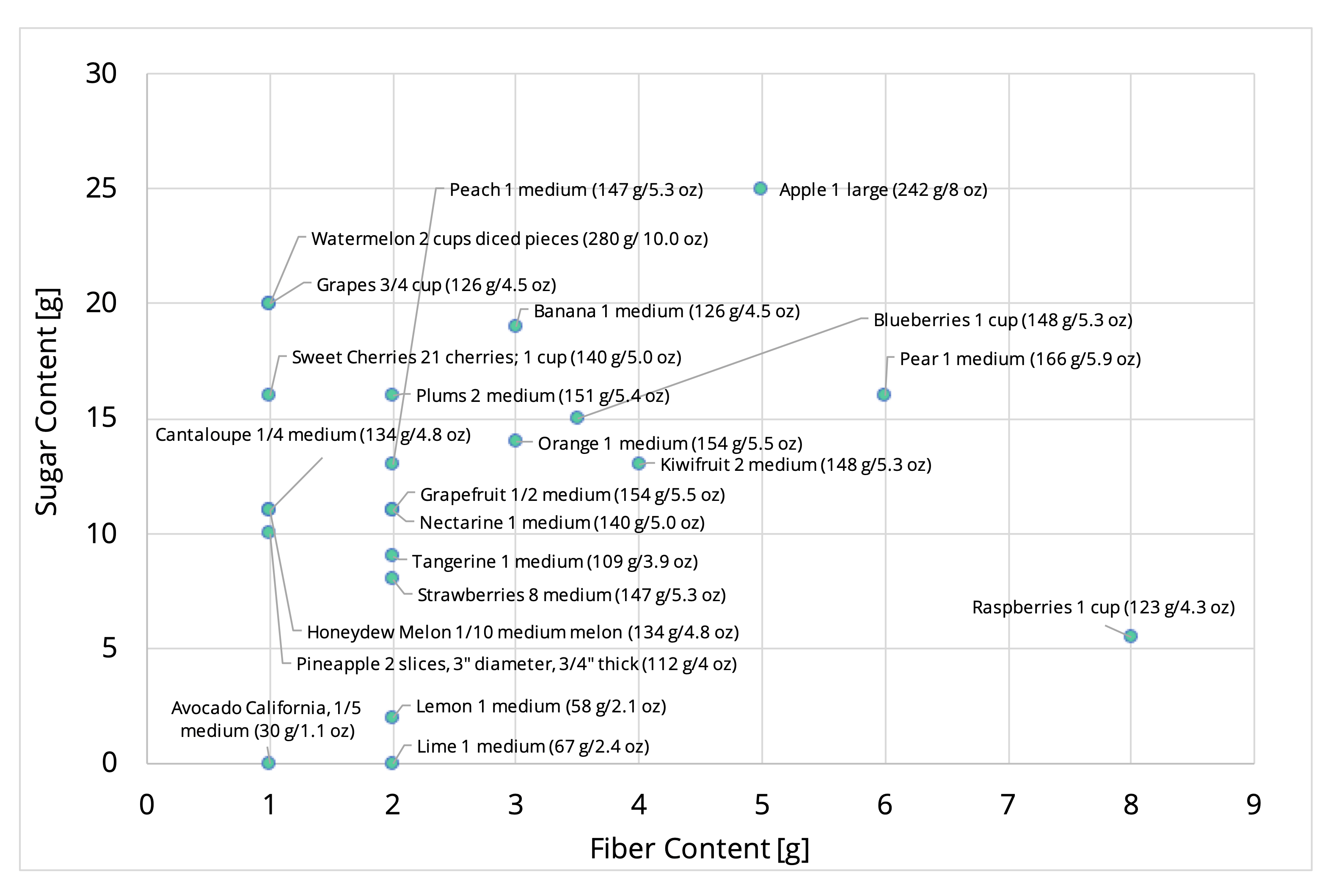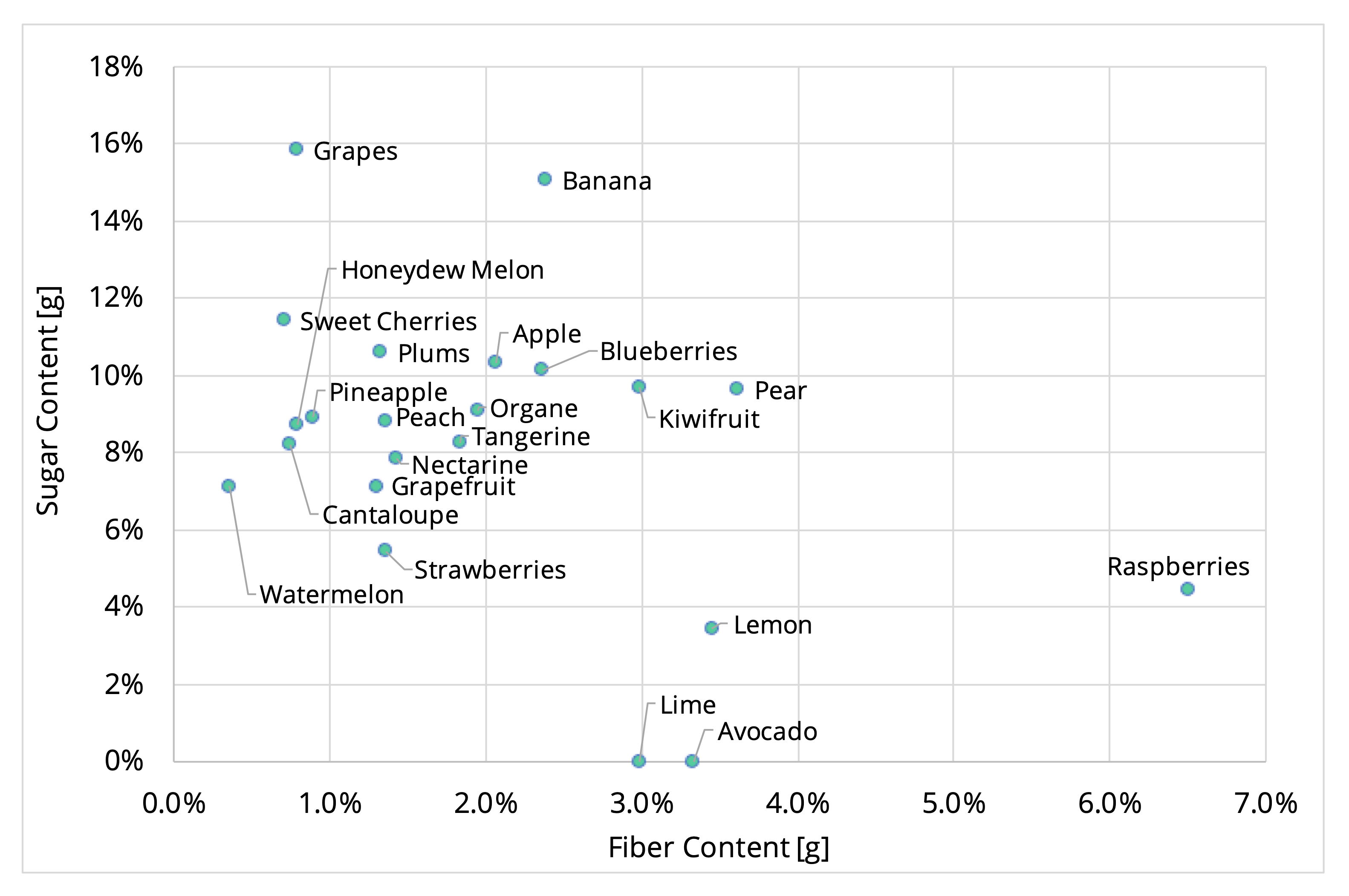Everyone’s got a view on fruits for PCOS. I’ve had them all over the years.
This is a nuanced topic with many variables that deserves a complete explanation. But the short answer is that when it’s well-executed, fruit can play an important role in a PCOS-friendly diet.
That’s what we put into practice during my free 30-Day PCOS Diet Challenge.

Pros & Cons of Fruit for PCOS
Fruits can be a great source of vitamins, minerals, antioxidants, and fiber. But they’re also rich in sugar. Sugar is the most important food to avoid with PCOS so, these forces work against one another.
The fiber content of fruit is especially important. That’s because it changes the way fruit sugars are metabolized. This makes them less harmful than they otherwise would be [1-3].
Sugar and fiber are the key considerations when choosing the best fruits for PCOS. Looking at the different levels of various micronutrients doesn’t help with decision-making. All fruits contain healthy nutrients. But from a clinical perspective, these differences make little (if any) difference.
Best & Worst Fruits for PCOS
So, sugar is bad and fiber is good. But how do we apply this information?
The charts below show the sugar vs. fiber content of common fruits. Good fruits for PCOS are lower on the charts and towards the right. Those that sit high on the charts and to the left are the worst fruits for PCOS.
Figure 1 uses typical serving sizes. This lets you compare the difference between, say, eight strawberries, and one pear. Figure 2 uses a percent basis. This lets you compare differences between the same weight of different fruits.
Keep in mind that these are estimates only. The species of fruit and ripeness can significantly impact the sugar and fiber content.
 Figure 1. Sugar content vs. fiber for common fruits assuming typical serving sizes. Data source U.S. Food and Drug Administration.
Figure 1. Sugar content vs. fiber for common fruits assuming typical serving sizes. Data source U.S. Food and Drug Administration.
 Figure 2. Sugar content vs. fiber for common fruits on a percent basis. Data source U.S. Food and Drug Administration.
Figure 2. Sugar content vs. fiber for common fruits on a percent basis. Data source U.S. Food and Drug Administration.
This analysis shows that the best fruits for PCOS are lemons, limes, and avocados. But that’s not really what you have in mind when you’re hunting for something sweet.
The next best fruits include:
- Raspberries
- Pear
- Kiwifruit
- Strawberries
- Tangerine
- Grapefruit
- Nectarine
The worst fruits for PCOS include:
- Watermelon
- Grapes
- Cherries
- Plums
- Banana
Everything else sits somewhere between. This includes apples, oranges, peaches, blueberries, cantaloupe, honeydew melon, and pineapple.
5 Hacks for Eating Fruit
From a practical perspective, lists like the ones above have limited value. They show the relative differences between various types of fruit. But many other factors have much greater clinical significance.
For example, many beginners make the mistake of looking for low GI fruits for PCOS. Worrying about the relative differences in the glycemic index misses the most important point. The impact any fruit has on blood glucose levels is more dependent on serving sizes and how you prepare it.
That’s why you need to know these five hacks for eating fruit.
1. Follow a low-sugar lifestyle
If you’re not following a low-sugar, PCOS diet, then changes to your fruit consumption are not going to matter. This is because foods like gluten, dairy, and other sources of sugar are going to have an overwhelming impact on your insulin sensitivity.
To keep this simple, a large, 8 oz (240 g) apple contains 25 g of sugar. That’s about the same as 2 cups of Lucky Charms or 2 Reese’s Peanut Butter Cups. That’s what I used to call “breakfast”. After enjoying a Coke classic or two during the day (like I used to), the sugar found in a piece of fruit is practically meaningless.
The take-home here is that it’s not worth focusing on fruit until you’ve quit sugar elsewhere in your diet. This free 3-Day Meal Plan and my free 3-Day PCOS Diet Challenge are a great way to get started if you haven’t begun this process yet.
2. Eat whole fruit only
People are best adapted for eating fruit in its whole, unprocessed form. Whole fruit contains the greatest quantity of antioxidants and fiber. Remember that these nutrients can help neutralize the harmful effects of fruit sugars. Fiber also promotes better gut health and makes the fruit more filling. Once you start heating or juicing fruit, it loses a lot of the healthiest components.
3. Eat fruit with fat & protein
Consuming fruit in the presence of fat and protein slows the rate at which the sugar content causes blood glucose levels to rise. For people with insulin resistance, most fruits will cause blood glucose spikes when eaten on their own. But if you add yogurt, seeds, or nut butter, even high-sugar fruit has a lower glycemic load. My PCOS-Friendly Chia Parfait recipe puts this theory to work.
Eating fruit with or immediately following a meal achieves the same outcome.
4. Be smart about serving sizes
Serving size is the single biggest determinant of sugar and fiber intake from fruit. For women that take part in my free 30-Day PCOS Diet Challenge, I recommend limiting fruit to 1-2 servings per day. A “serving” is roughly 1 medium-sized piece or half a cup.
5. Avoid all dry fruits
For women wanting to know which dry fruits are good for PCOS, I only have bad news. Dried fruits concentrate sugar content. This can drive insulin resistance and exacerbate the range of PCOS symptoms. The only time I use dry fruit is in my PCOS dessert recipes. The reason this is okay is that all my recipes follow hacks 1, 3 and 4 too.
The Bottom Line
I know a lot of well-intentioned people that get hung up on fruit. Sure, you can get technical and do food accounting on sugar content. Maybe you want to look into the different micronutrients each fruit has and what the health benefits are.
But this is the wrong approach.
I’ve helped tens of thousands of women beat PCOS through diet and lifestyle interventions. My advice is to stick to my short list of “fruit hacks”. Don’t get hung up on things like wondering which type of fruit is best. If you follow this advice, then you can’t go wrong. Your outcomes are what matter. So don’t sweat the small stuff.
Author
As a Nutritionist, I’m continuing my mission to help women like you, beat PCOS. Evidence-based diet and lifestyle interventions helped me overcome five years of infertility. I fell pregnant naturally after multiple failed IVF cycles. Along the way, my other PCOS symptoms went away too. This experience taught me how to combine the latest science with a pragmatic approach to habit change. I’ve now helped thousands of other women achieve life-changing results, and I love for you to be the next PCOS success story. Learn more about me and what I do here.
References
1Jaffe, R., Chapter 4 – Diabetes as an Immune Dysfunction Syndrome, in Bioactive Food as Dietary Interventions for Diabetes, R.R. Watson and V.R. Preedy, Editors. 2013, Academic Press: San Diego. p. 41-52.
2Beisner, J., et al., Fructose-Induced Intestinal Microbiota Shift Following Two Types of Short-Term High-Fructose Dietary Phases. Nutrients, 2020. 12(11).
3Monro, J., et al., Dietary Fibre and Organic Acids in Kiwifruit Suppress Glycaemic Response Equally by Delaying Absorption-A Randomised Crossover Human Trial with Parallel Analysis of (13)C-Acetate Uptake Nutrients, 2022. 14(15).
As a Nutritionist, I’m continuing my mission to help women like you, beat PCOS. Evidence-based diet and lifestyle interventions helped me overcome five years of infertility. I fell pregnant naturally after multiple failed IVF cycles. Along the way, my other PCOS symptoms went away too. This experience taught me how to combine the latest science with a pragmatic approach to habit change. I’ve now helped thousands of other women achieve life-changing results, and I love for you to be the next PCOS success story. Learn more about me and what I do here.



